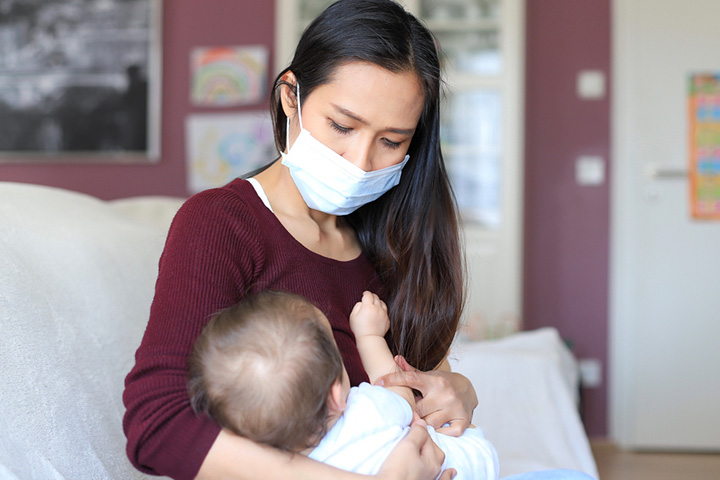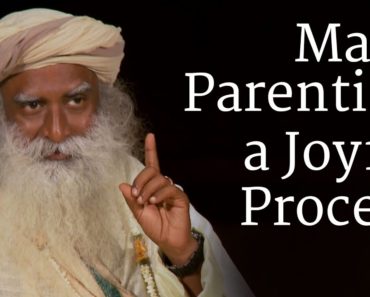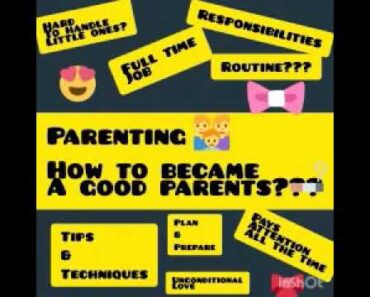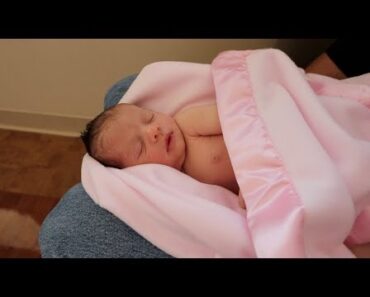Image: Shutterstock
Adequate breastfeeding is required for the normal growth and development of an infant. Breast milk also provides compounds that may protect against various diseases. World Health Organization (WHO) and U.S. Centers for Disease Control and Prevention emphasize the initiation and continuation of breastfeeding by COVID-19 positive mothers.
Mothers are advised to breastfeed their babies while observing precautions. Expression of breast milk and separation of the mother could be considered based on the risks and benefits.
Mothers and other caregivers should follow behaviors such as washing hands and wearing masks while breastfeeding and caring for the babies. Read this post to know the safety and precautions while breastfeeding during COVID-19 infection.
Is COVID-19 Transmitted Through Breast Milk?
Current evidence demonstrates that breast milk is not likely to spread COVID-19 to babies. You may discuss with your healthcare provider to decide how to begin and continue breastfeeding. The decision to breastfeed during COVID-19 should be based on the benefits of breastfeeding that outweigh the risks of breastfeeding with coronavirus disease.
A study of COVID-19 positive women found antibodies against COVID-19 in breast milk. The RNA (ribonucleic acid) of SARS-CoV-2, which causes the disease, was not found in any breast milk samples. However, several swabs of the nipple contained SARS-CoV-2 RNA. The study noted that there seems to be no risk of viral transmission through breast milk, but the virus may transmit through the breast’s skin. However, more extensive research is needed to arrive at a conclusion (1).
Is It Safe To Breastfeed During COVID-19 Infection?
You may breastfeed your child after discussing with your doctor if you have symptoms of COVID-19 infection or a positive test result. Breast milk is the best source of nutrients for your baby, and it protects against many illnesses.
The decision to breastfeed and mother-infant contact should not be based only on risks of contracting COVID-19 infection but also risks of mortality and morbidity due to not breastfeeding. Infant formula may not provide all the immunity factors provided by breast milk.
The World Health Organization recommends initiating or continuing breastfeeding by mothers with suspected or confirmed COVID-19 infection and counseling mothers about the benefits of breastfeeding (2).
Precautions For Breastfeeding With COVID-19
The following tips are recommended for COVID-19 positive mothers during breastfeeding (3).
- Wear a mask that covers your mouth and nose when you are near (within six feet) your baby.
- Wash your hands with soap and water or rub an alcohol-based sanitizer containing more than 60% of alcohol before breastfeeding, that is, before touching your baby.
The following tips are given to COVID-19 positive mothers who choose to express breast milk for feeding (3).
- Wash hands before touching bottle parts, breast pump, and while expressing the breast milk
- Wear a mask during breast milk expression
- Use your own pump and avoid sharing it with others
- Clean the pump and bottles as recommended
- Consider having a caregiver who does not have COVID-19 to bottle-feed and take care of the baby when you are in isolation
How To Keep Your Baby Safe During The Pandemic?
The following tips may help reduce COVID-19 exposure and other risks associated with the pandemic in babies (4).
- Do not put masks or face shields on children under age two since this may increase the risk of sudden infant death syndrome (SIDS), strangulation, and suffocation.
- Caregivers, parents, and anyone with suspected or confirmed infection must wear face masks, sanitize their hands, and maintain social distance with the babies. CDC does not recommend face shields as an alternative to masks.
- Limit in-person visits to your newborn since asymptomatic persons can also spread illness if they are infected. You may encourage friends and family to see the newborn virtually until the pandemic subsides.
Caregivers, parents, and other family members should also follow appropriate behaviors outside the home to avoid contracting the virus. Seek prompt medical advice if your newborn has any signs and symptoms of COVID- 19 or other infections.
mRNA COVID-19 Vaccine Safety During Breastfeeding
The Pfizer-BioNTech and Moderna vaccines are mRNA vaccines without inactivated viruses. You may see the recent recommendations in your country to choose the lactation-safe vaccine.
Clinical trials for the COVID-19 vaccine in the U.S. did not include breastfeeding mothers. Thus, there is no data available on vaccine safety and its effects on breastfed babies and breast milk production. However, based on the studies on how vaccines work in the body, vaccines are considered not to be a risk to nursing moms and breastfed babies. Therefore, lactating mothers can receive the COVID-19 vaccine (5).
Recent studies show that the breast milk of vaccinated mothers could contain COVID-19 antibodies, which could protect their babies. However, more data is required to know the effectiveness of these antibodies in babies.
Separation And Expressed Milk During COVID-19
The decision to separate the mother and newborn due to COVID-19 and the breastfeeding method should be made by the healthcare team based on the risks and benefits. If the mother and baby can stay together, breastfeeding is encouraged with precautions.
Breast milk expression and separation are recommended for some cases with severe infection, or the infant has risk factors. The World Health Organization recommends breastfeeding and skin-to-skin contact in all possible cases considering it has several benefits for the mother and the baby.
Is It Possible For A Newborn To Have COVID-19?
Newborns may contract COVID-19 during childbirth or from exposure to sick caregivers after delivery. Although vertical transmission has not been reported, close contact with an infected person, including the mother, can make the baby get COVID-19. The spread of the virus can be through direct contact or by inhalation of respiratory droplets.
If you are waiting for the results of the tests, it is recommended to wear masks and sanitize hands before caring for newborns.
Women who are planning to become pregnant are advised to receive the COVID-19 vaccine. There is no evidence that any vaccine, including the COVID-19 vaccine, causes fertility problems. Exclusive breastfeeding for the first six months of life is essential for infants’ optimal growth and development. You may seek advice from the healthcare provider to know the best method to feed your baby if you have coronavirus disease.


































